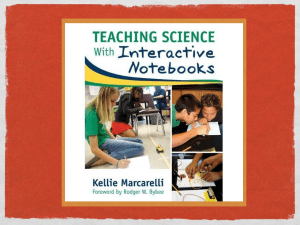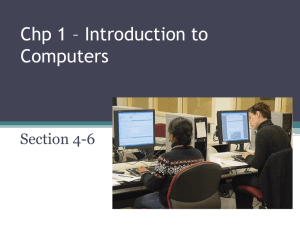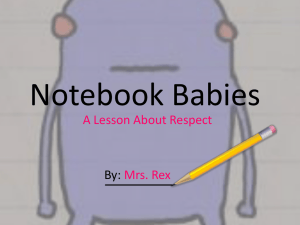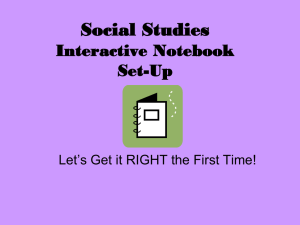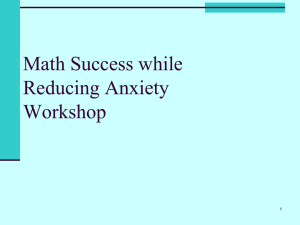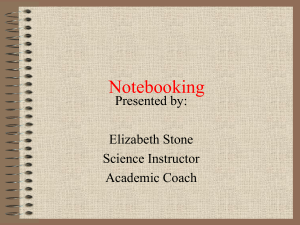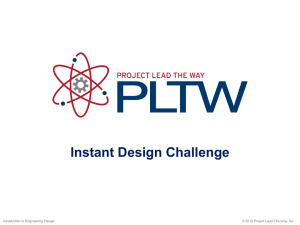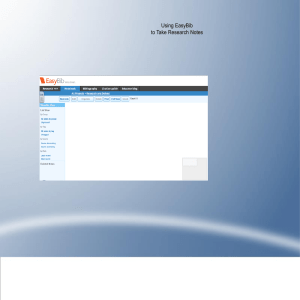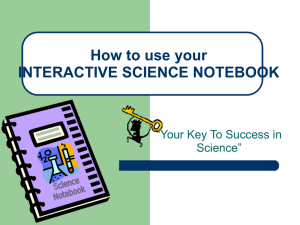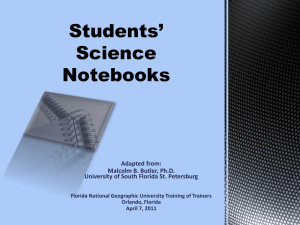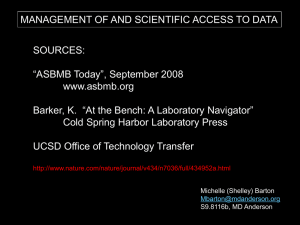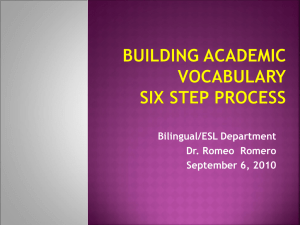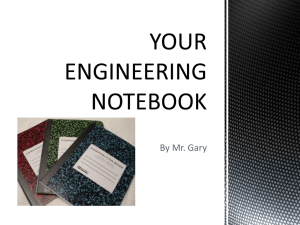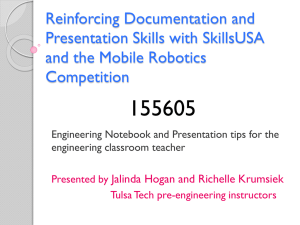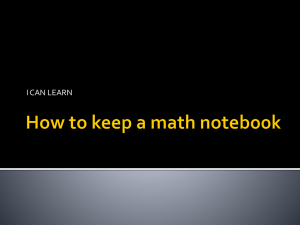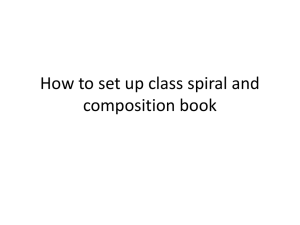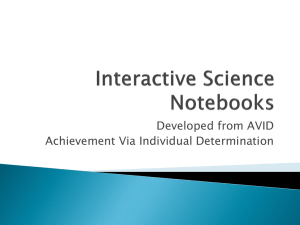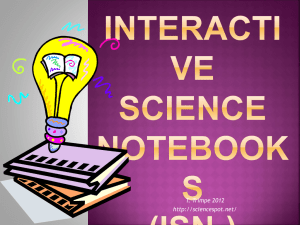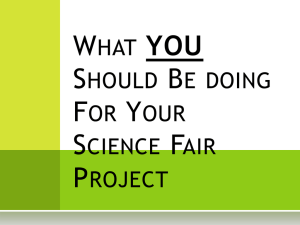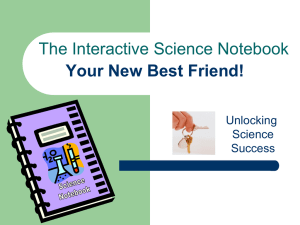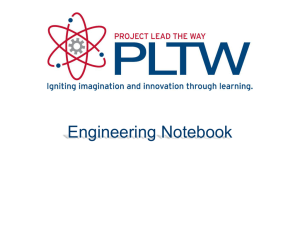Interactive Science Notebooks conference
advertisement
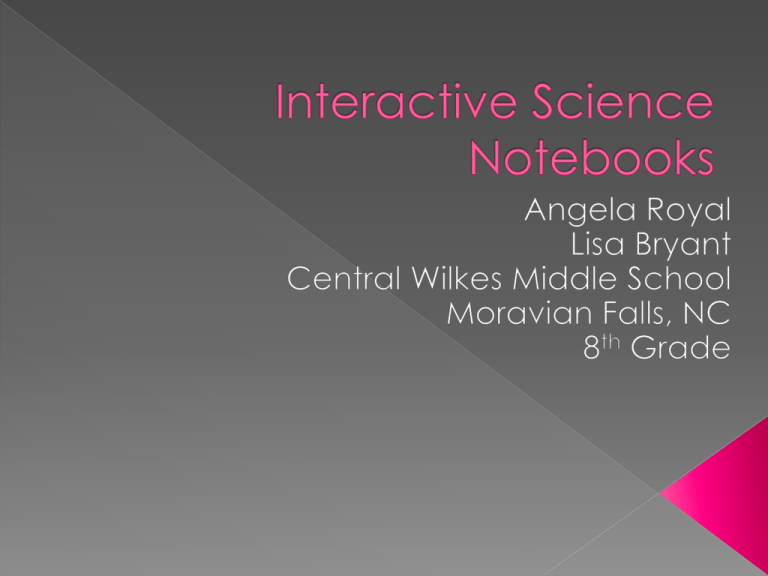
a tool students use to make connections, revise their thinking, and to deepen their understanding shows both the content learned (input) and the reflective knowledge gained (output) increases student thinking and achievement prepares students to be part of the 21stcentury workforce increases communication between stakeholders differentiating instruction › Relevant and rigorous Interactive Notebooks support effective instruction This notebook style uses both the right and left hemispheres of the brain to help students: › sort › categorize, › remember › creatively interact with the new knowledge they are gaining Place these terms in the order that shows how student benefit from interactive notebooking › Retain › Understand › Process › Reflect Process Understand Retain Reflect Each notebook has: › A designed cover that reflects the author’s personality › An author’s page to give ownership › Resource pages Model, model, model › I modeled the entire first unit › Then, depending on your class, you may model, model, model as needed Notebook › Spiral or binder Colored pencils Highlighters Glue and/or tape Each unit begins with › A Unit Cover Page › AHA connection pages Odd numbered pages – teacher input Even numbered pages – student output Two options › Self Reflection Paper › Research Paper Students are allowed to use notebook on any assessment I use a rubric Organizational/management › No loose papers › Spot check › Student choice Formative/Summative › AHA – a reflection of what they learned › Self Reflection paper - summative Using writing as a way to show thinking and explain reasoning Allowing students to behave like a scientist Improving their ability to organize ideas and information to help them study, and build a skill they will carry on to high school Serving as a portfolio of scientific understanding Novels Grammar/stems Math http://interactive-notebooks.wikispaces.com/ http://www.sciencenotebooks.org/ http://mysciencelessons.wordpress.com/category/in teractive-notebook/ http://www.ericdigests.org/2004-4/notebooks.htm http://www.nsta.org/publications/news/story.aspx?id =57384 cwmsroyal.pbworks.com › Click on the “Interactive Science Notebook” link › You will find: This PowerPoint Additional information Handouts Name: Birthday: Hobbies: Your Picture Here My Interactive Notebook Author’s Page Draw things that describe you on this page. You may also use photos, magazine cut outs, or computer art. (Ex. Favorite Food, Favorite Class, Pets, Family, Favorite Movie or Book, etc.) Right – side page Includes the unit title Student illustrations These two pages are a spread Provides a place for students to record the key question and the summary statements about the major concepts they are learning throughout the unit Most important pages of the unit because they are a reflection of students’ ongoing learning throughout the unit pp. 14 – 15 Scientists learn about the natural world through scientific inquiry. They ask testable questions, design and perform investigations, and use the data collected as evidence of their thinking. We modeled the work of a scientist with the mystery cube activity… What is Scientific Inquiry? Pp. 22-23 pp. 18-19 A good hypothesis must be a logical, testable answer to a scientific question. Scientists use the scientific method ,,, Left Side ( Student Output) Right Side (Teacher Input) How does a scientific question differ from other types of questions you may ask? precise Science Starter Activity Answered by collecting evidence Scientific Questions Based on observations testable Mysterious M & M’s: Questions You Could Investigate A, Color B, Number C. Etc. Notes: •The work of a scientist begins with a question. •A scientific question is one that is precise and can be answered through… •Mysterious M & M’s Activity •Observations using all senses •Break open candy and make a drawing •Complete activity •Record observations in words and drawings Students write a five-paragraph reflective paper about their work during the unit › Count the number of assignments › Choose four that best supports the AHA Justify choices by giving specific examples why these best support the unit AHA › Paragraph rating their notebook › Paragraph about the notebook Keeps me organized “My notebook has helped me learn and discover new ideas “ “aha” summaries reminded me of what we learned each day and how they all tied in together …” “The (use of) color highlights key ideas and enhances understanding.”

